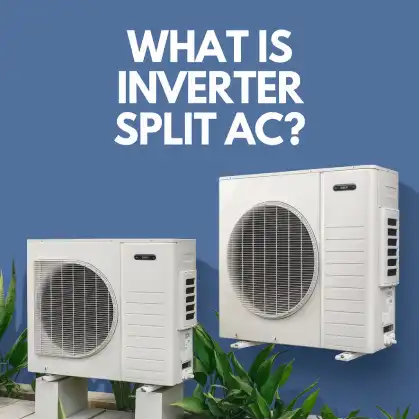Introduction to Inverter Split AC
When shopping for an air conditioner, you’ve probably come across the term inverter split AC. But what exactly is it, and why is it considered better than conventional air conditioners?
In simple terms, an inverter split AC is an air conditioning unit that uses inverter technology to regulate the speed of the compressor, ensuring energy efficiency and consistent cooling. Unlike traditional ACs that turn ON and OFF repeatedly, an inverter AC adjusts its speed based on the room temperature, making it more efficient and cost-effective.

Features & Benefits of Inverter Split AC
1. Energy Efficiency:
One of the biggest advantages of an inverter split AC is its low power consumption. Since it adjusts the compressor speed rather than turning it ON and OFF, it consumes 30-50% less electricity compared to non-inverter models.
2. Consistent Cooling:
Traditional ACs fluctuate in temperature because they shut down and restart frequently. Inverter ACs, however, maintain a stable temperature, ensuring continuous comfort.
3. Quieter Operation:
Because the compressor runs at variable speeds instead of starting and stopping abruptly, an inverter AC operates with minimal noise, making it ideal for bedrooms and offices.
4. Longer Lifespan:
The smooth operation and reduced load on the compressor lead to less wear and tear, extending the life of your AC unit.
5. Faster Cooling:
Unlike non-inverter models that take time to cool a room, an inverter split AC adjusts its speed dynamically, cooling the space much faster.
Common Issues with Inverter Split AC and Their Solutions
While inverter split ACs are highly efficient, they can sometimes face certain issues. Here are some common problems and how to fix them:
1. High Initial Cost:
- Issue: Inverter ACs are generally more expensive than traditional ACs.
- Solution: Consider it a long-term investment, as it saves significantly on electricity bills over time. Look for seasonal discounts or EMI options to make it more affordable.
2. Gas Leakage:
- Issue: If the AC is not cooling effectively, it may be due to refrigerant leakage.
- Solution: Get it checked by a professional and schedule regular servicing to avoid such issues.
3. Inconsistent Cooling or Overcooling:
- Issue: Sometimes, the AC may not cool evenly or may cool too much.
- Solution: Ensure that the thermostat settings are correct and the air filters are clean. Improper installation can also cause this issue.
4. Higher Maintenance Costs:
- Issue: Repairs can be slightly more expensive due to the advanced technology used.
- Solution: Regular cleaning of filters, coils, and outdoor units can prevent major breakdowns and save on repair costs.
5. Power Supply Fluctuations:
- Issue: Voltage fluctuations can affect the inverter technology.
- Solution: Even though most inverter ACs have built-in stabilizers, it’s advisable to use an external voltage stabilizer in areas with frequent fluctuations.
Choosing the Right Inverter Split AC
If you’re considering investing in an inverter split AC, keep these factors in mind:
✅ Capacity:
Choose an AC based on your room size (1 Ton for small rooms, 1.5 Ton for medium, and 2 Ton for large rooms).
✅ Energy Rating:
A higher BEE star rating means better energy efficiency. Go for a 5-star inverter AC if electricity savings are a priority.
✅ Brand & Warranty:
Reliable brands like Daikin, LG, Samsung, and Blue Star offer great features and longer warranties.
✅Smart Features:
Some models come with Wi-Fi connectivity, voice control, and air purification for added convenience.
For expert advice on AC installation and maintenance, check out our services at AC Repair Service in Delhi
Frequently Asked Questions (FAQs)
Is an inverter split AC better than a normal AC?
Yes, an inverter split AC is more energy-efficient, provides consistent cooling, and operates more quietly than a normal AC.
Does an inverter AC work without a stabilizer?
Most modern inverter ACs have built-in voltage stabilizers, but if your area experiences frequent voltage fluctuations, a stabilizer is recommended.
Is maintenance higher for inverter ACs?
No, inverter ACs do not require more maintenance than non-inverter ACs. Regular servicing (twice a year) is enough to keep them running efficiently.
Can an inverter AC run 24/7?
Yes, an inverter AC is designed to run continuously while adjusting the compressor speed. However, it’s best to give it occasional breaks for optimal efficiency.
Does an inverter split AC save money in the long run?
Yes, due to its energy-saving technology, an inverter AC significantly reduces electricity bills, making it a cost-effective choice in the long term.
An inverter split AC is a great investment if you’re looking for efficient cooling, lower electricity bills, and long-term durability. Hope this guide helps you make the right choice!
